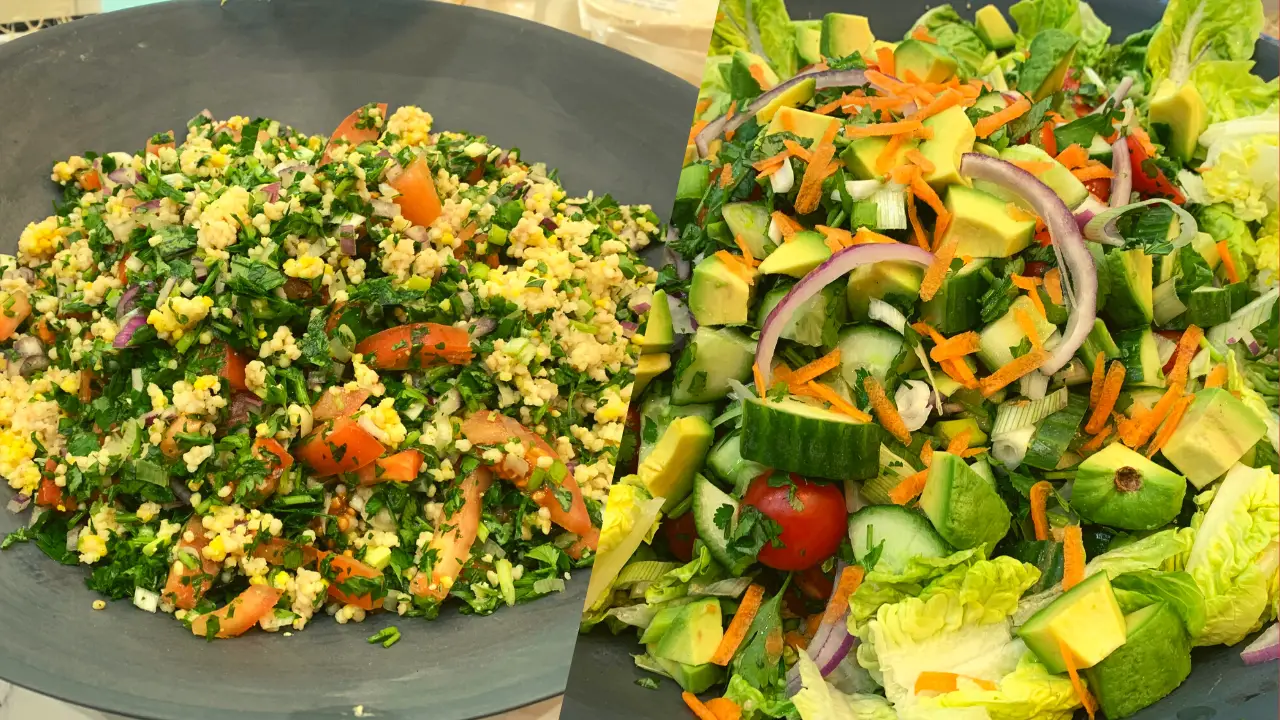What is the difference between Vegetarian & Vegan food?
Vegetarianism is a diet that avoids meat, poultry, and fish but may include dairy and eggs. On the other hand, veganism is a lifestyle and diet that avoids all animal products, including meat, poultry, fish, dairy, eggs, honey, and any other animal-derived ingredients.
Both vegetarians and vegans believe in reducing harm to animals, but vegans take it a step further by avoiding all forms of exploitation and cruelty to animals. Vegans also have concerns about the environmental impact of animal agriculture and the use of resources to produce animal products.
In terms of health, both vegetarian and vegan diets can be healthy if planned correctly and include a variety of foods. However, vegans need to pay special attention to getting enough vitamins and minerals that are commonly found in animal products, such as vitamin B12, calcium, and omega-3 fatty acids.

Finally, the choice between a vegetarian or vegan lifestyle is a personal one and may be influenced by ethical, environmental, or health considerations. Both lifestyles can lead to positive outcomes, but it is important to educate oneself on proper nutrition and to make informed choices.
Can Vegans eat chocolate as part of their diet?
Yes, vegans can eat chocolate, but it depends on the ingredients used in making the chocolate. Some chocolates contain dairy products or other animal-derived ingredients such as milk fat, which makes them not suitable for vegans.
To ensure that the chocolate is vegan-friendly, vegans should look for chocolates that are labeled as “vegan” or “dairy-free” on the packaging. Many dark chocolate varieties are naturally vegan, as they are made without milk or other dairy products. Some dark chocolate bars may still contain other animal-derived ingredients, so it is important to check the ingredients list.
Additionally, some chocolate brands offer vegan options made with alternative milk sources such as almond, coconut, or soy milk. These options provide a creamy texture and rich taste similar to traditional chocolate, but without the use of animal products.
Some of my articles may contain affiliate links, which means I earn a small commission at no extra cost to you but it does help me with the running costs. As an amazon associate, I will earn commissions on purchases but this does not affect my reviews on products or services.
In conclusion, vegans can enjoy chocolate as part of a healthy, balanced diet, but it is important to choose wisely and check the ingredients list to ensure that the chocolate is free from animal-derived products.
Can vegetarians eat jelly?
It depends on the type of jelly. Some jelly products may contain gelatin, which is a protein derived from animal collagen. Gelatin is commonly used as a gelling agent in jelly, candy, and other food products. As a result, some jelly products may not be suitable for vegetarians.

However, there are vegetarian-friendly jelly options available. These jellies are made using alternative gelling agents such as agar-agar, which is derived from seaweed, or pectin, which is derived from fruits.
To determine if a jelly product is suitable for vegetarians, it is important to check the ingredients list. If the product contains gelatin, it is not suitable for vegetarians. If it contains agar-agar or pectin, it is likely suitable for vegetarians.

In conclusion, vegetarians can enjoy jelly as part of a balanced diet, but it is important to choose wisely and check the ingredients list to ensure that the jelly is free from animal-derived products. Vegetarian-friendly jelly options are widely available and provide a delicious and convenient way for vegetarians to enjoy this treat.
What is a pescatarian?
A pescatarian is someone who follows a diet that includes fish and other seafood but avoids meat, poultry, and other land-based animal products such as beef, pork, and chicken. The term “pescatarian” is derived from the Italian word “pesce,” which means fish.
Pescatarians may adopt this diet for a variety of reasons, including health, environmental, or ethical concerns. Some pescatarians believe that consuming seafood is a more sustainable and eco-friendly alternative to meat, while others may choose this diet to reduce their intake of red and processed meat for health reasons.
In terms of health, a pescatarian diet can provide many health benefits, as seafood is a good source of lean protein, omega-3 fatty acids, and essential vitamins and minerals. However, it is important for pescatarians to choose seafood that is low in mercury and other contaminants, and to limit their consumption of certain types of fish that are high in these toxins.

In conclusion, the pescatarian diet is a flexible and varied diet that offers many health and environmental benefits. By including fish and other seafood in their diet, pescatarians can enjoy a range of delicious and nutritious foods while avoiding meat, poultry, and other animal products.
Why do people choose to be vegetarian?
People become vegetarians for a variety of reasons, including ethical, environmental, health, and spiritual considerations.
Ethical concerns are a common reason for becoming a vegetarian. Many individuals believe that raising animals for food is cruel and inhumane, and choose to avoid animal products to reduce harm to animals. Some people also believe that using animal products contributes to the exploitation of animals and the destruction of wildlife habitats.
Environmental considerations are another reason why people become vegetarians. The production of animal-based foods requires large amounts of resources, such as water, land, and energy, and contributes to deforestation, water pollution, and greenhouse gas emissions. By avoiding animal products, individuals can reduce their environmental footprint and help preserve natural resources.

Health reasons are also a common motivation for becoming a vegetarian. A well-planned vegetarian diet can provide all the nutrients needed for optimal health and can reduce the risk of certain chronic diseases, such as heart disease, type 2 diabetes, and certain types of cancer.
Finally, some individuals adopt a vegetarian diet for spiritual or religious reasons. For example, some Buddhist, Hindu, and Jain traditions promote non-violence and the avoidance of animal products as a means of reducing harm to all living beings.
In conclusion, the decision to become a vegetarian is a personal one that can be influenced by a variety of reasons, including ethical, environmental, health, and spiritual considerations. Regardless of the motivation, a vegetarian diet can offer many health and environmental benefits and can be a fulfilling and delicious way of eating.
Related posts
- Best carrot cake recipe 2023 quick easy & delicious

- Best apple sponge cake moist and delicious

- How to make the perfect sponge cake moist and tasty




2 thoughts on “What is the difference between Vegetarian & Vegan food?”